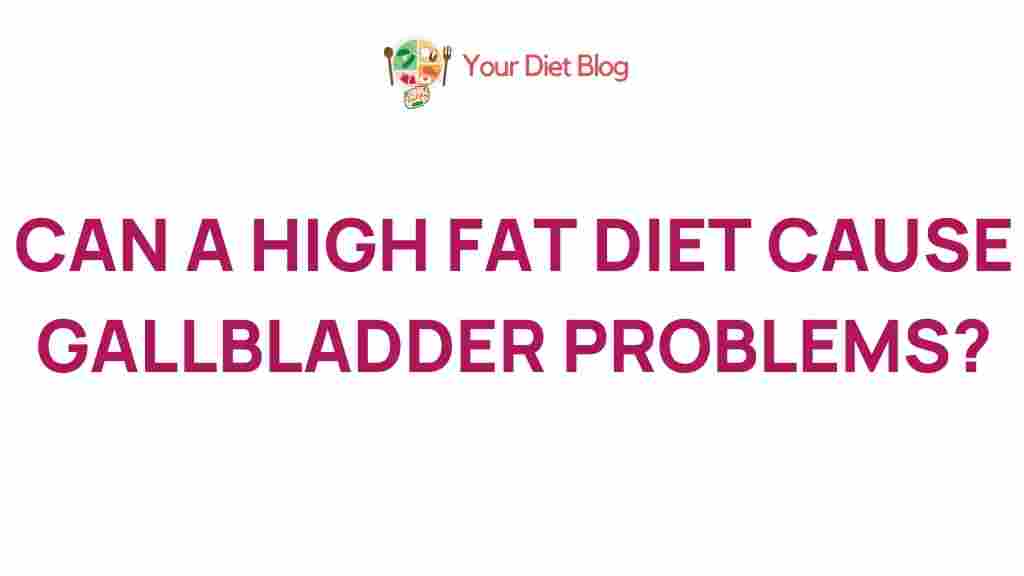The Connection Between a High Fat Diet and Gallbladder Health
Understanding the relationship between a high fat diet and gallbladder health is crucial for maintaining digestive wellness. The gallbladder, a small organ responsible for storing bile, plays a pivotal role in fat digestion. However, dietary patterns, particularly those involving high fat intake, can significantly influence its function and overall health.
In this article, we’ll explore how high fat diets affect the gallbladder, delve into the science behind bile production, and provide practical tips for optimizing your diet to support gallbladder health.
What Does the Gallbladder Do?
The gallbladder is a key component of the digestive system. It stores and concentrates bile, a digestive fluid produced by the liver, which helps break down fats in the small intestine. When you consume a high-fat meal, the gallbladder releases bile to aid in fat digestion and absorption.
How a High Fat Diet Impacts the Gallbladder
A high fat diet can have both positive and negative effects on gallbladder health. Here’s how it can influence this vital organ:
- Stimulated Bile Flow: A diet rich in healthy fats can promote consistent bile flow, preventing bile stagnation that could lead to gallstones.
- Gallstone Formation: Excessive unhealthy fats, such as trans fats or saturated fats, may contribute to cholesterol buildup in bile, increasing the risk of gallstones.
- Gallbladder Contractions: High fat meals prompt the gallbladder to contract, which, if frequent and excessive, could lead to inflammation or gallbladder issues.
Signs of Gallbladder Distress
While a high fat diet isn’t inherently harmful, certain symptoms may indicate gallbladder distress, such as:
- Sudden pain in the upper right abdomen
- Nausea or vomiting after high-fat meals
- Indigestion or bloating
- Yellowing of the skin (jaundice) in severe cases
If you experience these symptoms, consult a healthcare provider promptly.
Balancing a High Fat Diet for Gallbladder Health
Maintaining gallbladder health while enjoying a high fat diet involves smart choices. Here are some strategies:
1. Choose Healthy Fats
Replace trans fats and saturated fats with healthy fats like:
- Omega-3 fatty acids: Found in salmon, flaxseeds, and walnuts.
- Monounsaturated fats: Present in avocados, olive oil, and almonds.
2. Incorporate Fiber
Fiber aids digestion and reduces the risk of gallstones. Include fiber-rich foods such as:
- Fruits like apples, pears, and berries
- Whole grains like oats and quinoa
- Vegetables like broccoli and leafy greens
3. Moderate Meal Sizes
Overeating can strain the gallbladder. Opt for smaller, balanced meals throughout the day to promote better digestion and gallbladder function.
4. Stay Hydrated
Adequate water intake helps maintain bile consistency, reducing the likelihood of gallstone formation.
5. Exercise Regularly
Physical activity supports overall digestion and prevents obesity, a key risk factor for gallbladder disease.
What to Avoid on a High Fat Diet
While enjoying a high fat diet, it’s essential to steer clear of certain foods that may harm your gallbladder:
- Fried foods
- Processed snacks
- Full-fat dairy products
- Sugary beverages
For more tips on crafting a gallbladder-friendly diet, check out our comprehensive guide on digestive health.
When to Seek Medical Advice
In some cases, dietary adjustments may not be sufficient to resolve gallbladder issues. Seek medical attention if you notice:
- Persistent or severe abdominal pain
- Fever or chills accompanying digestive discomfort
- Dark urine or pale stools
For more in-depth medical information, visit Healthline.
Conclusion
While a high fat diet can support gallbladder function when balanced with healthy choices, overindulgence in unhealthy fats may lead to complications like gallstones or inflammation. By prioritizing healthy fats, incorporating fiber, and staying active, you can promote gallbladder health and overall well-being.
Remember, small changes in your dietary habits can have a significant impact on your digestive health. Monitor your symptoms and consult a healthcare provider if necessary to ensure your gallbladder remains in optimal condition.
This article is in the category Nutrition Basics and created by YourDiet Team
